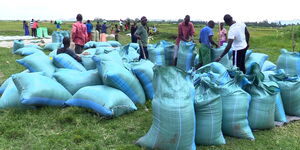As the saying goes, necessity is the mother of invention. Human beings are good at finding solutions to problems that they face through innovative ways that improve their livelihoods.
A number of farmers in Kenya are now adopting hydroponics. This is the practice of growing plants using water, nutrients and a growing medium. The word Hydroponics comes from the word “hydro” meaning water and “ponos” meaning labor.
The earliest documented use of hydroponics was back in the ancient world, the Hanging Gardens of Babylon.
Although the general theory remains the same, new technologies have been incorporated to enable farmers to grow plants that grow faster, stronger and healthier.
Green life Veggies experts gave a Kenyan.co.ke an insight on how the practice is conducted.
One of the greatest advantages of using this method is that it uses water rather than soil is water conservation. Farmers growing plants on the soil must always monitor how they water their crops. Too much water and the roots of the crops will lack oxygen and on contrary too little water and the plants wither.
Hydroponics solves this problem in 3 ways;
1. Using less water
The system uses less water due to the recirculation of water back into the system. Only a small amount of water actually gets used by the plants. Hydroponics allows for the excess water to be deposited back to the water reservoir for future use. The experts explained that this is good for farmers in arid areas.
2.Oxygenated Nutrient Reservoir
Water is oxygenated to the optimum levels and nutrition fit for the certain crop a farmer is growing is added to the water reservoir. Plants find it easy to absorb nutrients due to the fact that the root system is not covered in soil.
3. Total Growing Control
The farmer has total growing control over the environment. Pests and diseases are easier to deal with because of the raised nature of plantations. All soil-related diseases and pathogens are completely written off in hydroponics.
The expert from Greenlife veggies also noted some problems faced in this kind of farming. Market fluctuations are one of the biggest problems. The scaling down of purchases by buyers like hotels due to COVID-19 is a big problem as the hydroponics farms bring a bumper harvest with them compared to traditional soil farming.
The initial capital to venture into these farms is also costly, an estimate to start a commercial tomato plantation is about Ksh 700,000.
Other plants that could do well in hydroponics are but are not limited to; Kale,onions, spinach, coriander and lettuces.
Farmers with an interest in hydroponics can visit green life veggies in Rungiri for a tour to learn about the practice at a fee of Ksh 2000.












